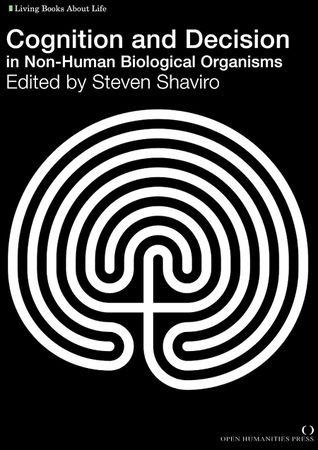Cognition and Decision: Difference between revisions
No edit summary |
No edit summary |
||
| Line 3: | Line 3: | ||
<br> | <br> | ||
= '''Cognition and Decision''' = | = '''Cognition and Decision in Non-Human Biological Organisms''' = | ||
= edited by Steven Shaviro = | = edited by Steven Shaviro = | ||
Revision as of 15:28, 7 September 2011

Cognition and Decision in Non-Human Biological Organisms
edited by Steven Shaviro
Introduction
What is the relationship between life and thought? Are all living organisms capable of thinking? Or is thought restricted to animals with nervous systems and brains? Or is it restricted only to human beings, or to us and a few of the other ‘higher’ animals? In any case, what is the relation between thought (which takes place, we like to say, in the mind) and the actual physical processes that take place in the brains of animals and human beings when they are thinking? For that matter, what does it mean to say that thinking, like other forms of organic activity, is subject to, and determined by, physical laws? Is it meaningful to ascribe ‘free will’ to human beings and other organisms? Or are thought processes strictly deterministic, so that ‘free will’ is just an illusion?
These are all speculative, metaphysical questions, which philosophers have been actively discussing for at least several thousand years. They cannot be answered by science alone. But at the very least, biological research of the past several decades has given us vastly more information about cognition and thought, in human beings and in other organisms, than we ever possessed before. In what follows, I would like to look briefly at some of this research, and ponder its implications. (more)
Decision-Making and Free Will in Biological Organisms
Gabor Balazsi, Alexander van Oudenaarden, and James J. Collins
Cellular Decision Making and Biological Noise: From Microbes to Mammals
Alexander Maye, Chih-hao Hsieh, George Sugihara, Bjorn Brembs
Order in Spontaneous Behavior
Bacterial Cognition
Eshel Ben Jacob, Yoash Shapira, Alfred I. Tauber
Seeking the Foundations of Cognition in Bacteria: From Schrodinger's Negative Entropy to Latent Information
Plant Cognition
Anthony Trewavas
Aspects of Plant Intelligence
Ian T. Baldwin, Rayko Halitschke, Anja Paschold, Caroline C. von Dahl, Catherine A. Preston
Volatile Signaling in Plant-Plant Interactions: "Talking Trees" in the Genomics Era
Cognition and Decision in Slime Molds
Toshiyuki Nakagaki, Ryo Kobayashi, Yasumasa Nishiura, and Tetsuo Ueda
Obtaining Multiple Separate Food Sources: Behavioural Intelligence in the Physarum plasmodium
Tanya Latty and Madeleine Beekman
Irrational Decision-making in an Amoeboid Organism: Transitivity and Context-dependent Preferences
The Biological Basis of Cognition, Decision, Activity, and Moods
Björn Brembs
The Importance of Being Active
Melissa Bateson, Suzanne Desire, Sarah E. Gartside, and Geraldine A. Wright
Agitated Honeybees Exhibit Pessimistic Cognitive Biases
Attributions
